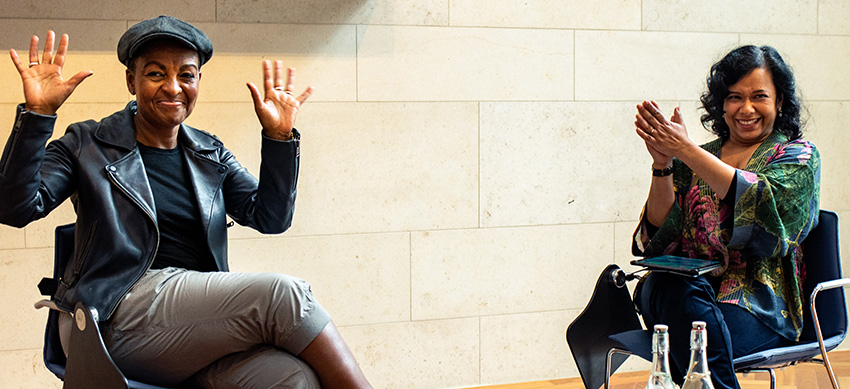‘We have to be able to hold these stories all the same time’: Adjoa Andoh in Conversation with Nandini Das

Photo of Adjoa Andoh and Nandini Das by Faith Wong (2020, English)
‘I never have the desire to distress, I want [people] to see themselves’, the renowned actress Adjoa Andoh tells a packed audience at Exeter College’s Cohen Quad.
In a wide-ranging conversation with English Fellow, Professor Nandini Das, the celebrated actor who played Brenda Mazibuko in Clint Eastwood’s Invictus (2009) and who plays Lady Danbury in the ongoing hit-series Bridgerton told us about her life growing up in Leeds, Bristol, and the Cotswolds; her experience directing Richard II at the Globe Theatre with a cast made up entirely of women of colour; and her conviction to unearth the silenced Black and British stories of the past while opening doors for others.
The conversation took us back to Andoh’s experience growing up in rural and working-class communities in Britain in the 1960s. In part that growing up was learning how to navigate people’s perceived differences and advocating for oneself. Andoh felt one thing fundamentally: ‘anytime you run across that feeling “it’s not fair”, that is usually a sound instinct.’
From reckoning with unfairness in childhood, we moved to Andoh’s time at Shakespeare’s Globe in London, directing Richard II. For much of its performance history, leading roles in Shakespeare’s history plays in particular have been confined to white, and often male actors, but Andoh’s casting choices rewrote that received script with women of colour at its centre. Especially moving were her descriptions of the history of Black women in the London theatre community, describing a sense of the collective even when two people were up for the same job. It is this kind of ethos that made its way into her production of Richard II. As Andoh explained, it was a production that tried always to centre people as community members first and provide spaces for understanding and compassion. This ethos of mutuality informed the entire production, which encouraged actors to bring their own experience and history into the acting space. Andoh described how this was acknowledged even in the props, which provided an implicit reminder of places that England had colonised, and their own histories – India, Africa, and the Caribbean.
So far, as the writer of this blog chronicling an event, I have mostly left myself out of the exposition. But I can say, as an audience member, coming from several groups minoritised in elite spaces, the talk modelled ways for me to make my voice heard while also opening doors for others. Das and Andoh demonstrated what it means for us to navigate these spaces and make them our own while remaining generous with the resources and privileges we gain while attending them. I think often about studying literature and what it means to study and become expert in a language that colonised my own. But even that word – ‘own’ – presumes that this language, and this history, does not belong to all of us. Adjoa’s insistence that we ‘hold these stories all the same time’ is a reminder of the world’s complexity, of the narratives that can so easily be afterthoughts and then erased from our consciousness. Her talk serves as a poignant reminder that we come to these spaces with a whole life and story beyond it, and taking up space is also a responsibility – to listen, to keep those spaces open, and to bring others along with us.
As Andoh put it, ‘for the rest of my life, that’s all I want to do with the work I do is [to] say everybody come in.’
For this audience member, she certainly had held out that message of openness and hope.
Dominic Madera is a Donovan-Moody Scholar at Exeter College, Oxford, pursuing a second BA in English Language and Literature. He is originally from Houston, Texas, in the United States, and he is a current intern at TORCH. He is interested in many things; most of them revolve around the rhetoric and narratives of gender, race, and sexuality written in English.
For more information about Adjoa Andoh click here.
For more information about Professor Nandini Das click here.
To watch the Adjoa Andoh and Nandini Das talk click here or use the media player below.
